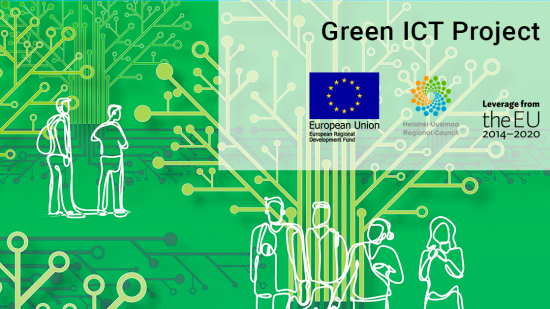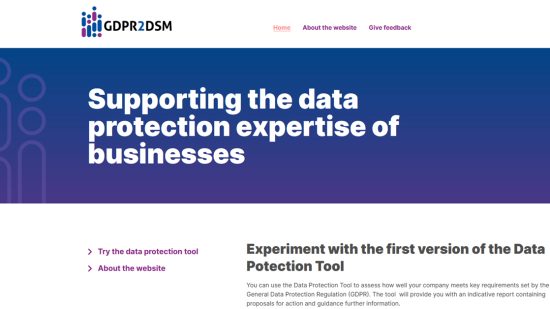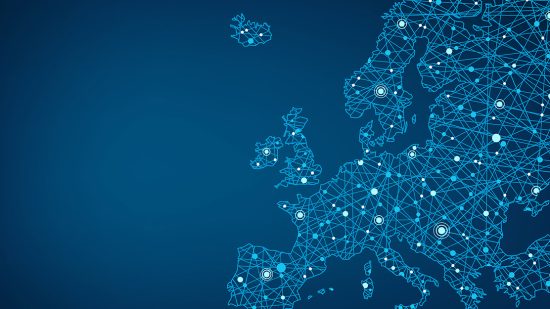National and international climate goals also apply to the ICT sector – more and more so as curbing climate change requires more extensive and low-carbon solutions. ICT products and services also have a great potential to affect carbon emissions in other sectors, because digitalisation is everywhere in the 2020s. These combined with the requirements of both B2C and B2B customers has resulted in a challenging situation. More and more organisations selling or buying digital services and devices are keen to reduce their emissions, but do not know where to start and what resources to use.
In Finland, the importance of ecosystems in the development of technology sectors has been emphasised, among others, by the Academy of Finland, the Ministry of Economic Affairs and Employment, the Ministry of Finance and other key organisations within the industry. This is why the Finnish Information Society Development Centre (TIEKE), LUT University and the Finnish Information Processing Association (TIVIA) have established the Green ICT ecosystem to specifically promote sustainable ICT development. The work has begun in the Green ICT project, financed by the European Regional Development Fund through the Helsinki-Uusimaa Regional Council.
The ecosystem brings professionals together
The Green ICT ecosystem is a network of organisations that unites professionals to promote the ICT sector’s sustainability transition. Participants include professionals from academia, public administration, private companies of all sizes and NGOs. The ecosystem also creates new opportunities for cooperation and facilitates dialogue between various interest groups.
Three main functions have been defined for the ecosystem:
- to promote sustainable ICT development
- to increase competitiveness in the Finnish ICT sector
- to promote cooperation in business and RDI
The potential for profit through climate- and environment-friendly solutions is significant. More than 90% of industrial jobs are created by SMEs, so supporting their establishment and growth is particularly important. This is why one of the ecosystem’s focus points is offering small and medium-sized companies resources and support to participate in the green transition. Innovations that create growth, and turning such innovations into marketable products, can also be sped up with new type of public procurement.
ICT and the climate
Sustainability challenges in the ICT sector have to do with the life cycle and materials of devices, inefficient software solutions and the energy consumption and carbon footprint of the overall infrastructure.
Information and communication technology currently accounts for, depending on the estimate, between 4 and 10% of global energy consumption. Energy consumption is expected to triple by the end of the decade, so saving energy within the sector is crucial.
The life cycles of devices are becoming shorter and shorter due to rapidly developing technology, and ICT devices use 800–1,000 chemicals, of which many are toxic light and heavy metals, and bromine and plastic compounds.
According to an Aalto University study, the power demand of software increases in proportion to the power of the technology. The potential for profit for solving these challenges, according to a GeSI report, will run into thousands of billions of dollars during this decade.
Operation of the ecosystem
An open Green ICT information portal will be developed for ecosystem work, as well as a collaboration platform for ecosystem members. The ecosystem will provide its members with expert services to upgrade their ICT sustainability. The ecosystem also organises various lectures and events. In the autumn of 2022, for example, an RDI event for businesses and higher education institutions and a practical workshop on sustainable coding are in the works.
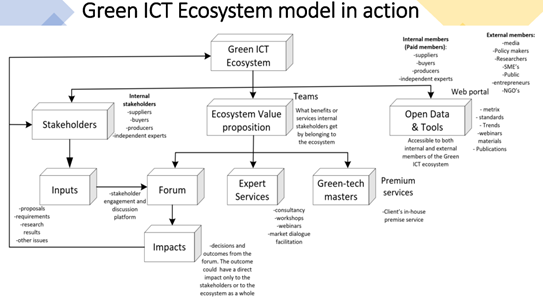
In its open information portal, the ecosystem will publish materials, information and free development tools to help companies become greener in terms of their products and procurement. The material bank’s content will be produced by TIEKE’s partners, the organisations taking part, and other networks engaging in similar work. These will discuss, for example, sustainable development in the digital context and present solutions for low-emission ICT solutions. The tools are developed in Green ICT projects supported by the European Regional Development Fund. These will help organisations to assess their own level of sustainability and to get ideas for their sustainability transition.
What do professionals expect from a sustainable ICT ecosystem?
At the first meeting of the ecosystem in June, we wanted to learn about the needs of the 80 organisations present. Professionals both making and buying ICT devices report requiring tools and information about funding to improve their networking and cooperation within the ecosystem.
The workshop organised for procurement professionals highlighted expertise and information sharing concerning procurement skills and best practices, and there was interest in hearing about successful ICT procurement cases. Another clear area of need concerned concrete, easy-to-use metrics for sustainability assessment. There was also a clear demand for opportunities for more informal discussions, with less marketing talk.
The workshop organised for service providers shared concerns of silos being created in organisations. We want to avoid a situation in which people only process their own ideas in isolation, re-inventing the green wheel over and over again. Cooperation in the SME sector in particular offers an opportunity to develop one’s operations with the help of strengths offered by partners. Another form of cooperation that producers would like to see is entering competitive tendering with a joint offer, as individual tenders often fall short in certain respects.
The parties in charge of the Green ICT project have been very pleased with the reception of the ecosystem work. If you want to know more about this work, please contact TIEKE or our project partners!
Green ICT project
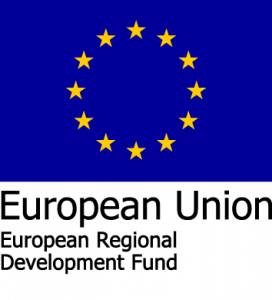

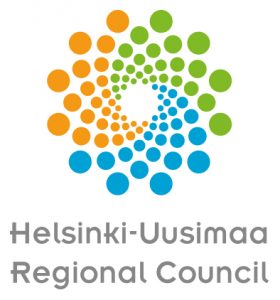
The project A Green ICT ecosystem – building sustainability and competitiveness for businesses in the Uusimaa region is funded by the REACT-EU-call from the European structural fund. Funding has been granted as part of EU recovery measures to lessen the effects of the COVID-19 pandemic.
Funding period
1. June 2021 to 31. May 2023
Project contacts
TIEKE:Antti Sipilä, antti.sipila[at]tieke.fi
LUT-university: Jari Porras, jari.porras[at]lut.fi
TIVIA: Janne Mustonen, janne.mustonen[at]tivia.fi


